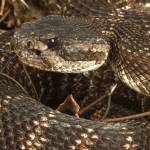Rattlesnake Bites May Be Serious for Horses

Horse owners may have read or heard that rattlesnake bites won’t kill a horse because the snake’s venom is designed for killing smaller animals, while horses, being much larger than the snake’s natural prey, are not in much danger from a bite. Actually, the outcome of snakebite in a horse depends on several things including the location of the bite, the amount of venom injected, the horse’s overall health status, and the treatment the horse is given.
Horses, being curious, tend to investigate things that interest them. This tendency leads some horses, especially foals and young horses, to stretch their heads and necks toward a poisonous snake just to see what it is and what it will do, hence the frequency of bites on the muzzle or head of a horse. Swelling from bites in this location may block the nostrils, a result that can kill the horse even though the venom itself is not specifically the cause of death. Bites on a horse’s legs are less commonly fatal.
It’s true that the amount of venom required to kill a mouse or rabbit is usually not sufficient to kill a much larger animal like a horse. However, young foals, very old horses, or sick animals may be affected more seriously than mature horses. Any horse that is bitten by a rattlesnake is at risk for extensive tissue damage near the bite, damage to heart and nerves, and disorders involving excessive bleeding, low platelet levels, and slow blood-clotting times.
When veterinarians at the University of California reviewed records of 58 horses with rattlesnake bites, they found that mortality was 9%. This group included only horses admitted to the school’s veterinary hospital after being bitten, so the percentage may not indicate a true fatality rate for all horses that were bitten (some bitten horses may not have been brought to the hospital). More than half the horses needed a tracheotomy to allow them to breathe; other treatments were antibiotics, nonsteroidal anti-inflammatory drugs, corticosteroids, and doses of an equine-derived antivenom product. To make this product, horses that had not been bitten were given low doses of venom and then their plasma was collected. Nine horses were treated with this antivenom product, and none of these horses died.
If you own a horse that’s been bitten by a rattlesnake, don’t try to cut across the bite or suck venom from the wound. Get veterinary attention for the horse as quickly as possible, as prompt treatment lessens the impact and allows the horse to recover more quickly.
One more note: don’t assume your horse is safe just because you’ve never seen a rattlesnake on your property or in the areas where you go trail-riding. With more than 65 species and subspecies of rattlesnakes favoring a variety of habitats from Canada to Argentina, it’s not impossible that you and your horse may pass close to a rattlesnake at some time. Because these snakes are not generally aggressive unless they feel threatened, you may never know you’re in range.
Owners who want to protect their horses from the effects of a snake bite can ask their veterinarians about a newly developed vaccine that stimulates a horse’s immune system to produce antibodies against rattlesnake venom, greatly reducing the effects if a bite occurs. The vaccine is administered as a series of three injections. Maximum protection is reached about four to six weeks after the last dose, and a booster should be given about every six months to sustain the best immunity.








